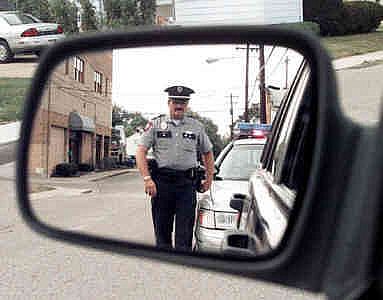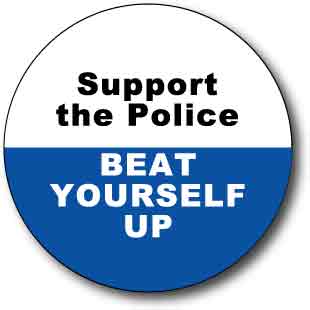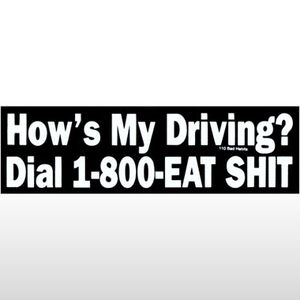





People react differently to seeing red and blue lights in their rear view mirrors. Some get angry, some cry, and some get nervous and say stupid things. The outcome of being pulled over depends almost entirely on the discretion of the police officer and how well you communicate and present yourself.
Set aside any lingering or even justifiable distrust of law enforcement and focus on getting through the next 10-15 minutes. It could make the difference between driving home with a verbal warning and getting zapped with a taser.
ONE: The moment you see the lights come on, find a SAFE place to pull over. If you’re on the highway, immediately slow down, signal, and look for an exit. If there is no exit nearby, pull over as far away from traffic as possible. Consider the inattentiveness of other motorists and the officer’s safety as well as yours.

TWO: Immediately put your car in park, open all of your windows, turn on your interior lights, and shut off the ignition. Place your keys on TOP of the dashboard, place one hand out the window, and place the other on top of the steering wheel. Turn off your radio.
This lets the officer know that he is safe, that you aren’t hiding anything, that you aren’t going to start the car and take off, and that you aren’t going to shoot him in the face as he approaches the vehicle. Imagine how unnerving it may be to approach a stranger’s car in the middle of the night. Anything you do to put the officer at ease will work to your advantage.
This should also prevent you from being asked to search your vehicle.
None of this is required of you as a free citizen and you certainly have the right to keep your windows closed and protect your privacy. However, the intent here isn’t to flex your constitutional rights. The goal is to smooth over and put some ease into a potentially tense encounter, to avoid receiving a costly ticket or escalating the situation.
THREE: Always keep your registration and insurance in a readily accessible location, like the very top of the inside of your glove box. Let the officer know that you need to open your glove box to get to it. Being organized will prevent you from being cited for missing paperwork, especially proof of insurance.
FOUR: Use respectful language. When asked to show your license and papers, say “Yes sir” and continue to refer to the officer that way until the interaction is over. It’s a way of letting the officer feel like he is in control of the situation, that force isn’t required to gain your compliance. Speaking clear, coherent English is also a plus, and if you’re the kind of idiot who wears a flat-billed baseball cap, take it off.
When asked why you were pulled over, you don’t have admit to breaking the law (and you probably shouldn’t). Just say you’re not sure why and act slightly surprised (try not to be sarcastic). Just nod and politely say “Oh” or “Sorry about that.”
FIVE: Keep your vehicle presentable. Occasionally check your head lights and tail lights. I’ve seen some GM cars rolling down the road with completely dead rear lights.
Keep your car reasonably clean inside and out. An interior stuffed with McChicken wrappers may suggest that you’re an irresponsible person with an inclination for lawbreaking behavior. It’s a stretch, but it’s how the mind operates. Every detail counts.
Choose your bumper stickers carefully. Here’s some examples of bad ones:


Don’t put those on your car.
I once had a sticker back in 2004 that said “Annoy a liberal: Work, succeed, be happy.” My brother was driving my Infiniti Q45 one night, speeding, and the officer loved the sticker so much he let him go with a warning. Of course, encountering a liberal member of law enforcement might have the opposite effect.
I’m not a lawyer, nor am I qualified to offer legal advice. I’ve been pulled over countless times for minor speeding (7-10mph over), weaving (messing with my iPod), accelerating excessively, or in one case running a yellow light, so I consider myself fairly experienced at being pulled over. In most cases I’ve received polite warnings. When cited for speeding, I pay a lawyer about $100 to take care of it, usually by amending the charge to non-moving while still paying a fine, to keep the points off my record so I can enjoy cheaper insurance.
And this advice applies to normal drivers who aren’t intoxicated, carrying dead prostitutes to the dump, engaging in street racing, smuggling illegal immigrants, or running from the law. If you’re doing any of that, all the “Yes sirs” in the world won’t help you.
Leave a Reply